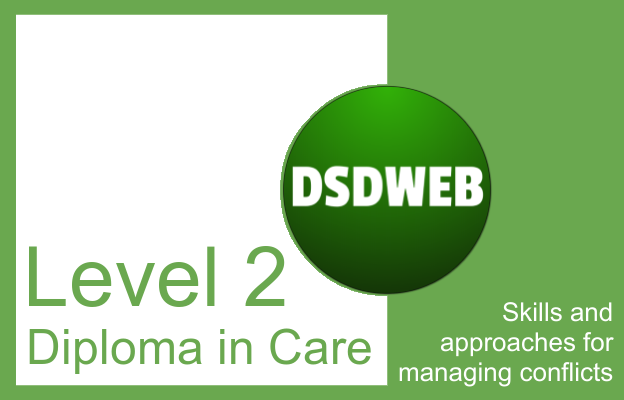This page is designed to answer the following questions:
- 3.3 Identify skills and approaches needed for resolving conflicts (Level 2 Diploma in Care, Responsibilities of a care worker)
- 3.3 Identify skills and approaches needed for resolving conflicts (Level 3 Diploma in Care, Responsibilities of a care worker)
- 1.3 Explain ways to manage challenging situations (Level 3 Diploma in Adult Care, Promote communication in care settings)
- 3.5 Explain how to use communication skills to manage complex, sensitive, abusive or challenging situations and behaviours (Level 3 Diploma in Adult Care, Promote communication in care settings)
NOTE: This page has been quality assured for 2023 as per our Quality Assurance policy.
Although partnership-working means that everyone is striving towards the same goals, disagreements may arise about how this should be achieved. These conflicts must be managed effectively to ensure that the team continues to work together and collaborate effectively going forward.
Managing and resolving conflicts
It is extremely important to remain calm during conflict resolution and listen carefully to the feelings and views of everyone involved so that you can empathise with them and work towards a compromise that suits everybody. Active listening and negotiation can be essential skills for this. Achieving a win-win situation should be the ultimate goal.
It will be useful to establish early on exactly what the conflict is about. For example, is it personal or work-related? Does it relate to how a certain task should be performed? You should also ensure that the conflict resolution process is performed away from the work environment so that privacy and confidentiality are respected and professionalism is maintained.
You should ensure that you keep your feelings and emotions separate from the facts of the disagreement. You should be able to express your views calmly and succinctly and be assertive without coming across as aggressive. One technique is to:
- Describe the situation
- Express your views on the situation
- Explain what you think needs to be done
Avoid blame and focus on the disagreement rather than the individual. You should also avoid exaggerating, over-generalising or trivialising the issue.
Effective communication is a key component of resolving conflicts. This includes being open, honest and having a positive attitude with a genuine desire to resolve the dispute.
Sometimes there will be no resolution that will satisfy everybody so you may need to use negotiation skills to reach a compromise. When a compromise cannot be reached, mediation from a third party may be needed.
Other challenging situations
As well as managing conflicts, you will be called on to handle other challenging situations. This could include:
- Breaking bad news
- Working with individuals whose first language is not English
- Explaining to a family member that their loved one does not wish to see them today
- An individual disclosing that they have been abused
When faced with such situations, communication can help to manage them effectively. In cases where the reason for the situation occurring is unclear, you should seek to find out the possible antecedents. This will enable you to handle them in the most effective way.
Maintaining a calm outward composure, a non-threatening posture and using a soft but assertive tone of voice can help diffuse difficult situations. Keeping sentences simple and reducing the number of keywords used can aid understanding and comprehension.
Sensitively listening to an individual with empathy and compassion can help them to open up and establish trust. Particularly in cases where abuse is suspected, it is important to listen more than talk so that an individual’s account of what has happened is not inadvertently influenced.
You may ask the individual if they would like to be accompanied by a friend to offer them support and the location of the conversation should be private and somewhere that the individual feels safe. If emotions are running high, having a break where everyone has time to calm down and collect their thoughts can be useful.
You should always remain calm and offer support, empathy and compassion. You should listen to others so that they have the opportunity to express themselves and respect their views. In addition, you should maintain a positive attitude and ensure that you are patient with them.

